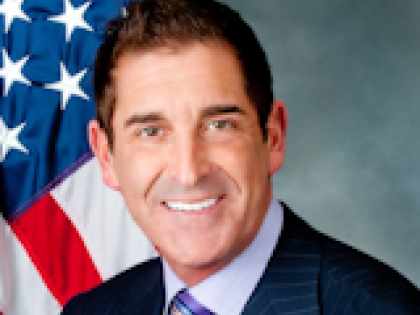
Catching Criminals Before They Strike Again
Jeffrey D. Klein
May 11, 2010
ALBANY, NY – State Senator and Deputy Majority Leader Jeffrey D. Klein (D-Bronx/Westchester), Assemblymember Joseph Morelle (D- Irondequoit), State Senator Eric Adams (D-Brooklyn), State Senator Martin Golden (R-Brooklyn), and State Senator George Onorato (D-Queens) joined representatives from the New York State Sheriffs' Association, the Center for HOPE, and victims’ rights advocates to call for passage of legislation mandating DNA collection upon arrest in an effort to put more criminals behind bars before they strike again.
Klein and Morelle’s “DNA upon Arrest” bill (S.6213/A.9425) would require New York State and City law enforcement agencies to collect DNA upon arrest for 67 felony crimes, including assault, murder, manslaughter, rape, sexual abuse, arson, burglary, robbery and incest.
“Right now thousands of crime scene cases remain unsolved in New York State. We can no longer stand by and watch this number continue to grow. The time is now for this legislation. We have the tools – we can save lives, put predators behind bars, and get real justice,” said State Senator Jeffrey D. Klein (D-Bronx/Westchester).
“On behalf of the families of victims awaiting justice, and for the families that may be spared the pain of violent crime, we must make use of the DNA technology available to us. I am proud to be with Jayann, who has given so much in the face of personal tragedy, and Senator Klein, whose advocacy on this issue has been tireless, as we propose adding New York to the growing list of states that have taken this critical and common-sense approach to law enforcement,” said Assemblyman Joseph D. Morelle (D- Irondequoit).
Currently NYS only requires DNA collection after a judge convicts a suspect of a felony crime or 18 specified misdemeanors. Once the DNA sample is collected, the information goes into a statewide DNA databank that also connects to a national databank. The statewide databank contains two types of samples - forensic DNA samples taken from a crime scene and samples taken from criminals after a conviction.
The NYS DNA databank launched in 1996. In 2006, NYS passed a law requiring DNA collection for all felony convicts, expanding the databank tremendously. From 1996 to the end of 2007, the program put a name and face to more than four thousand (4,142) crime scene DNA samples. Nearly one-third of those hits came in 2007, the first year after the DNA felony collection law was passed.
Klein and Morelle’s legislation would increase the pool of offenders in the NYS DNA Databank. As witnessed when the pool was expanded in 2006, the more suspects added to the databank, the more matches that are likely to occur and thus the more crimes that can be solved. Under this bill DNA would be taken at the same time the arrestee is fingerprinted.
Klein and Morelle’s bill would also help catch repeat offenders more quickly. According to the NYS Department of Criminal Justice Services (DCJS), on average, offenders linked to crimes on the DNA databank had approximately 11 prior arrests and five prior convictions. Eighty-three percent of offenders linked to sexual assault cases were in the state’s DNA databank for a crime other than a sex-related offense.
Under Klein and Morelle’s bills, should an individual not be convicted, they could request the purging of their DNA sample from the database.
“Violent crime is often committed by repeat offenders; we can enhance the ability of the police to solve crimes and perhaps have a meaningful influence on crime prevention if we expand our DNA databank by collecting DNA samples as soon as suspects in violent felonies are arrested, rather than waiting for a conviction. New York should adopt S.6213/A.9425, legislation introduced by Senator Klein and Assemblyman Morelle. Collecting DNA from suspects in more than 60 felonies will help convict the guilty, exonerate the innocent, and protect the public,” said State Senator Eric Adams (D-Brooklyn).
“I’m proud to be a cosponsor of this important piece of legislation that will go far in aiding our efforts here in New York State to reduce crime and see that justice is served. As a retired New York City Police officer, I can tell you that the best chance to solve a murder, and other heinous crimes, is to generate solid leads within 48 hours. After that, the trail gets cold. In my opinion, this legislation will become one of our most effective crime fighting tools here in New York and I urge my colleagues in the Assembly to support it,” said State Senator Martin J. Golden (R-Brooklyn).
“This legislation should help to ensure that some of our most violent and heartless criminals are identified and brought to justice sooner, before they can victimize even more innocent people. This expansion of the DNA databank may very well help to solve older crimes while preventing new ones,” said Senator George Onorato (D-Queens).
“Collecting DNA evidence upon the arrest of an individual for certain felony crimes can save lives. Waiting until a conviction to collect DNA gives too long of a window of opportunity for another violent crime to be committed and perhaps another innocent life to be taken. I commend and support Senator Klein for his commitment to protecting New Yorkers through this legislation,” said Senate President Pro Tempore Malcolm A. Smith (D-Brooklyn).
As of April 2010, there were 31,559 forensic samples in the NYS DNA Database taken from crime scenes throughout the state, amounting to nearly tens of thousands of unsolved crime scenes in New York State. While New York represents more than 10% of all of the unsolved crime scenes in the United States, however, its database contains only about 4.5% of all DNA profiles in the United States.
“The District Attorneys Association strongly supports legislation that requires the collection of DNA at the time of arrest. We commend Senator Klein and Assemblymember Morelle for recognizing what we have long known that expanded DNA collection enhances our ability to solve crimes and protect the people of our state. We believe that this issue is important and the legislature should consider this bill as soon as possible” said Kate Hogan, President of the District Attorneys Association.
“Mandated DNA collection on felony arrest has the proven ability to both to convict the guilty and to exonerate those wrongly accused or convicted. New York needs to join with the 21 other states that have already passed similar legislation,” said Doug and Mary Lyall, Co-Founders of the Center For HOPE.”
“I am grateful to stand with Assemblyman Morelle and Senator Klein today, and I thank them for their great commitment to an issue that means so much to me and to all those who lives have been changed by violence. We must give the police and courts all the tools possible to bring closure to tragic cases and prevent more from occurring. New Yorkers deserve this protection and are lucky to have leaders who understand this,” said Jayann Sepich.
“This is something we should've been doing a lot time ago. the DNA data base has solved a lot of crimes over the past few years. Any legislation that will help force arrestes to get into the system certainly will help solve future crimes," said Warren County Sheriff Nathan “Bud” York.
“As a New York State Sheriff, I fully support and applaud Senator Klein and Assemblymember Morelle’s leadership on the issue of mandating DNA collection upon arrest. The DNA database in New York State has already proven to be an extremely useful tool in solving serious crimes that might otherwise have gone unsolved. This legislation uses a common sense approach of mandating the collection of DNA from a very specific group of felony offenders whose DNA is likely to provide valuable evidence over time,” said Allegany County Sheriff William R. Tompkins.
Twenty-one states have already passed DNA upon arrest legislation including Texas, Virginia, Minnesota, California, New Mexico, Alaska, Arizona, Kansas, Tennessee, South Dakota, North Dakota, Maryland, Michigan and South Carolina. DNA upon arrest bills are currently pending in several other states including Colorado, Ohio, Pennsylvania and North Carolina. Federal law also allows for DNA collection upon arrest.
Share this Article or Press Release
Newsroom
Go to NewsroomJeremy Warneke
May 18, 2012

Deborah Slaner Larkin
May 15, 2012

IDC Announces Senate Passage of Erin Merryn’s Law
April 30, 2012